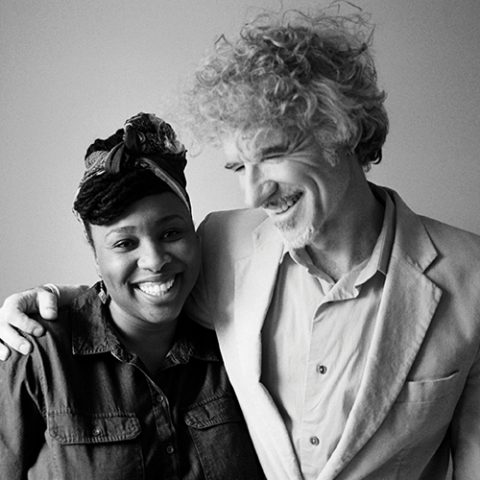Claudia Eliaza

That trackless train is Night Train 57, a sensory-friendly comic folk opera created by husband-and-wife duo Dan Zanes, a Grammy-winning family-music legend, and music therapist Claudia Eliaza B.M. ’07, with percussionist Yuriana Sobrino B.M. ’11.
Typically, a train “off the rails” would be alarming, and expressing yourself from a theater seat might result in a visit from an angry usher. But not at Zanes and Eliaza’s show, where that train is lifted into outer space, powered by the musicians on stage as well as by the audience. In the sensory-friendly movement, expression is not only allowed but encouraged.
Sensory-friendly performances are modified versions of popular productions, geared for those with Autism Spectrum Disorder (ASD) or other sensory-processing challenges. By subtly shifting the environment and being open to a range of audience behaviors, the productions create a safe space for people of all dispositions to enjoy art without fear of being perceived as “different” or “disruptive.”
The movement is taking off. In 2007, AMC Theaters began offering sensory-friendly film screenings, and today such programming can be found in theaters, museums, cinemas, and other performance spaces across the country. Even malls have joined in, offering Sensory Santa sessions during the holiday season, making Santa available before the mall is open to the public.
But for Eliaza, who studied voice and music therapy at Berklee, sensory-friendly isn’t only for those with ASD or who are otherwise not classified as neurotypical. In her view, sensory-friendly theater is an inclusive approach to theater and the future of the performing arts. “We just want to open the door wider to more people,” Eliaza says.
A Haitian-American, Eliaza was born in New Hampshire and moved to the San Francisco Bay Area as a teen. After high school, she landed a gig as a vocalist and instrumentalist for the Young Americans, a national K-12 music-outreach program. “To physically see how communities really can change because of the power of music—it resonated so deeply that I just knew that this was my work; this was my calling.”
She discovered that her students were learning much more than notes and charts. “Yes, we were working on music, but I think this was one of my first introductions to music therapy and how music can help other developmental areas in life. We’re working on confidence, self-esteem, collaboration, how to find your voice, how to complete something from start to finish, even if you are nervous.”
In fact, she wouldn’t have even known to use the term “music therapy” during her time with the Young Americans, and didn’t discover it until she began looking at colleges. “Something came in the mail [from Berklee] and on the cover it said ‘music therapy,’ and I’d never seen those two words together. And I thought, ‘I don’t even know what this means, but it makes sense to me.’”
After enrolling at Berklee, she looked for as many kinds of music therapy experiences as she could. “The reason why I really loved the Berklee program was that it really was such a wide range of populations that I got to work with each semester.” In this spirit, she designed her internship at Community Music Center in Boston in such a way that would allow her to work at multiple sites. She spent close to the next decade after the internship working at the center, eventually directing its music therapy program.
At the same time, Eliaza was growing her freelance music therapy career, working seven days a week. “There was lots of driving, as any music therapist will tell you,” she says. In a way, it was her trackless train, fueled by music, that eventually led her to a chance meeting with Zanes—a meeting that sparked both a musical and romantic partnership, setting the stage for their work in the sensory-friendly world.
Toward the end of 2016, Zanes was in Washington, D.C., finishing a separate project, and the
duo had the idea of reaching out to the Kennedy Center, which Zanes had worked with and knew to be a leader in the sensory-friendly movement. They met with Betty Siegel, the center’s director for the Very Special Arts and Accessibility Program, who invited them to do a commissioned piece, which eventually became Night Train 57, the first Kennedy Center production to be designed as sensory-friendly from the ground up.
Eliaza recruited fellow Berklee alumna Sobrino, a Mexican percussionist and comic actor, to round out the train crew trio. After a 10-show run in October 2017 at the Kennedy Center, Night Train 57 continues to chug, both as a studio recording (on CD and streaming online) and as a touring production, all in service to empowering as many audiences as possible.
“Everyone has their own relationship to music,” Eliaza says. “How they express it and how they articulate it—whether verbal or nonverbal—you have your own way of doing that. I welcome that. It’s a good opportunity for us to learn that our way isn’t the only way.”




